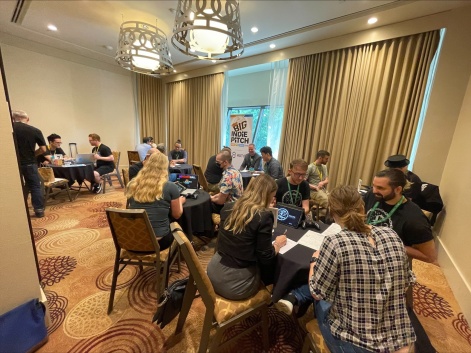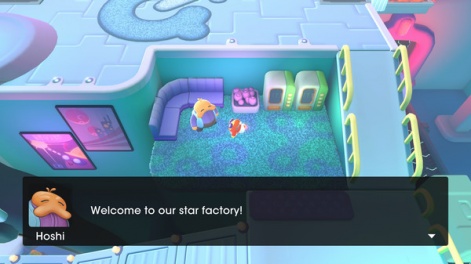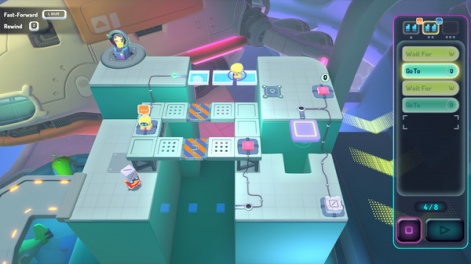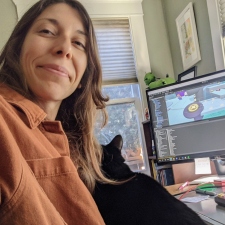The Big Indie Pitch is a regular event run by the makers of Pocket Gamer and PC Games Insider. It sees indie developers engage in a speed-dating-styled pitching competition for fame and those sweet, sweet promotional packages.
The event gives indies five minutes to pitch their games to a panel of press, publishers and industry pundits. The judges then pick three winners and everybody gets valuable feedback.
The indie view
The Big Indie Pitch is getting bigger and bigger as we bring it to events all across the world. To give you an idea of what the event is like, who attends the events and the games on show, we've sat down with several past Big Indie Pitch contestants to offer their views.
Today, we're speaking to Sylvia Aguiñaga from Ánimo Games Studio, who submitted Star Stuff to The Very Big Indie Pitch at Pocket Gamer Connects Seattle 2023 and walked away as the winner.

Sophia Aubrey Drake: Tell us a little about yourself and your indie studio - who is on the team, and what are their inspirations?
Sylvia Aguiñaga: We’re a small but mighty team brought together by three co-founders driven by the belief that games empower us to overcome any challenge. I named our studio after the word, “Ánimo”, Spanish for “encouragement”. It’s not as easily translatable as that. It implies the act of reassuring, inspiring, or cheering someone on to overcome a problem. It means “Don’t give up. You can do it.” But also invokes a certain state of mind. It felt perfect as we were committing to making games that make it feel good to try new ideas and make you feel hugged as you traverse through challenges.
Our founders have a unique background, coming from non-profit organizations working toward equity and access to high-quality thinky experiences. We all bring a different perspective and skillset to the team. Our game engineer, Daniel, is a self-taught programmer and retired WoW raid leader, a recipe for excellent leadership and commitment. When all hope is lost, it’s often Dan who shines a light on the solution. Michael, our game designer, is an unassuming level-making mastermind. You may or may not have raged at one of his infamous Super Mario Maker levels back in the day. His knack for design and engineering makes him an invaluable part of every game design discussion. His realistic nature keeps us all grounded. And then there’s me. I’m our CEO, narrative designer, producer, and Star Stuff hype woman. I like to think of myself as the sparkly glue that holds it all together. I keep the team on track, connected to the mission, and dreaming big. My death count in Celeste solidified my belief in games as art forms of agency and learning machines and I’ve never looked back.
I asked the team what they thought inspired me and this is what they said: the cosmos, and tiny, cute things. That’s mostly right. I also find inspiration in a good underdog tale, and people who care deeply about people. Dan & Michael aren’t big on talking about themselves so from our many many years working together, I’ve gleaned that Dan is inspired by pushing all the buttons and figuring things out. He loves to make useful things for the team. We love that, too. And Michael is inspired by great-level design. That, and a good PB&J.
Tell us about Star Stuff that you pitched at the competition.
Star Stuff is a cosmic puzzle automation adventure that mixes bot programming with real-time shenanigans. You play as Mija, a cosmic factory employee just trying to get on with their first day which may or may not involve saving the ever-expanding universe. Think the fun of traversing a puzzle ‘room’ like in Portal or The Talos Principle meets the easy-to-use coding mechanic of Human Resource Machine.
Star Stuff is not a game about programming, it’s a game about puzzling alongside programs. Give your bots directions, and as you see them play through, interact in real-time with bot actions. You become a piece of the puzzle itself. Direct your bot buddies to move, pick up, drop, wait… to zap space materials into bits, to log various variables, conditionals, loops, and more into memory. Encounter bots who have gone… rogue. No longer programmable and definitely no longer your buddies.
As you traverse each area of the star factory, you unlock new coding abilities and fitting puzzle mechanics. Every area is made up of three hubs, each of them introducing a new, interesting mechanic to discover and experiment with. With over 100 puzzles, you will find some pretty surprising things that will make you lovingly curse & proclaim yourself a genius all in the same breath.
What do you think are the most unique and interesting aspects of Star Stuff that gamers may never have seen before?
The mix of bot programming and real-time interaction is a fresh take on the genre. There are great programming games out there, but none of them involves the player quite like the way we do. When you’re playing Star Stuff, you feel like you’re in a Rube Goldberg machine you can manipulate yourself. You’re gaining confidence by having the agency to easily experiment with our mechanics and you’re practicing breaking down big problems one step at a time. The hope is that we’re creating a system where planning and live execution are seamlessly blended in one go and you are rewarded for thinking and learning, but never punished for making mistakes.
We’re interested in social-emotional learning, problem-solving, and coding skill development. We want to demystify what could be perceived as intimidating concepts to dive into, but we’re also very much so in love with the idea of modelling being kind to oneself as you learn and grow. I think these experiences should be experienced together. With Star Stuff, we’re developing with a special balance of heart and mind. I can’t say it’s unique to our studio, and I hope it’s not. But I do think it’s hard to get right, and we’re going to give it all we got.

Star Stuff is an intergalactic relaxing puzzle automation game. What made you choose to make this type of game, and what do you think you bring that may not have been seen before?
We met at a non-profit that teaches coding to kids and teachers. In 2020, we created our own software to introduce puzzle game experiments in the classroom. We simulated a puzzle adventure where the teacher played the role of the narrator and guided students in immersive puzzle-solving. Our work here & love for coding had a lot to do with our decision to make Star Stuff. We think it’s really special to flex that ‘think like a coder’ muscle & wanted to create a more dynamic, puzzley feel to levels by adding player interaction.
How did you come to choose the platforms that you would develop Star Stuff for?
I think we have a lot to learn in this aspect of game development, and unfortunately, the release data out there for indie games is hard to come by. So, we decided to start on PC/Steam, and from here, we’re thinking about where our audience is, what device Star Stuff makes sense to play on, and what is most accessible. We’d like to port to consoles (specifically Nintendo Switch.), and mobile if it makes sense from a discoverability perspective and resource perspective.
Looking at the studio a little more now. How hard is it to survive as an Indie developer?
It’s really hard to network and strategize around sustainability on top of building a great game and marketing it, too. We see that even the best games become ‘hidden gems’ on platforms that are overly saturated, so it’s really important to figure out how to stand out from the rest. This task is really overwhelming for a small studio.
Are there any tips and advice you would give to independent developers out there who are just starting out?
We’ve learned a lot in the past 2 years. The biggest lesson is to be very strategic during our planning stage. Build in graybox for as long as we can get away with it. Grow your team when you’ve gained enough confidence in the gameplay. Find your community, especially if you’re building a game that is pretty niche
Marketing a game sometimes feels just as hard as building one. Start early. Take full advantage of free resources like Chris Zukowski’s “How To Market A Game”. Also, seek out fellow indie devs who you see as successful in the genre. Ask them about their experiences & advice. I love indie game developers. They have been so generous and kind.
For funding, think ahead of the game. Seek out funding that aligns with your mission and allows you to sustain a team beyond the short term. Find angels with big hearts and an interest in the type of game or movement you are building.

How did you find your experience pitching as a part of the Big Indie Pitch?
It was incredibly good practice to prepare for & pitch eight times in a row. Winning the competition was really great validation & relief. It’s been a journey trying to find the right way to talk about Star Stuff. Our game has been difficult to explain so I was so happy that other people not only understood but really liked what they heard. Everyone was so lovely, both judges and fellow competitors. I walked away from that pitch with really good connections, and that type of prize is priceless. Although, the gold bat is pretty cool.
What do you feel you have gained from the experience, and what do you still hope to gain?
I’ve gained friends and motivation to continue working hard. We’ve also gained validation in the way we communicate our gameplay which is a huge step in marketing. We still hope to gain a publishing deal & more press opportunities.
What are your hopes for this game in the future, and do you have any plans for any future projects?
I envision a long life for Star Stuff. Of course, we hope it does well. We hope it makes players feel good about tackling problems one step at a time. We hope it encourages players to try new solutions when they’re stuck. We hope it creates a fun space to ‘think out loud’. We hope it makes players smile when they think about tiny star factory employees launching stars into space. So many hopes.
For the future, we have discussed the possibility of making Star Stuff Jr, making a level editor, etc. It all depends on the reception & we’ll go from there. We talk all too often about the next projects. The team really wants to make a first-person puzzle platformer, but we will see. One step at a time.
Want to show off your exciting new game? We host Big Indie Pitch events throughout the year, so be sure to keep an eye out on our events page for an event near you, or even our new Digital pitches.
All our upcoming pitches including how to enter can be found over on our upcoming events page on BigIndiePitch.com.
Get the latest news, interviews and in-depth analysis on Twitter, Facebook, and our daily newsletter.















